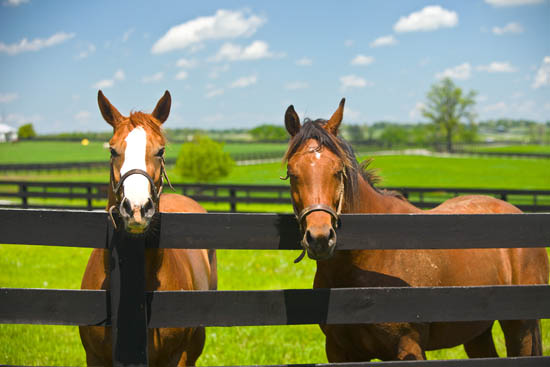The 2012 Kentucky Equine Survey about to begin
The 2012 Kentucky Equine Survey about to begin

Beginning next week, horse owners across Kentucky could be some of 15,000 “horse-holds” selected by the U.S. Department of Agriculture’s National Ag Statistics Service to contribute critically important information about Kentucky’s horse industry. Organizers urge those receiving a survey in the mail to promptly complete and return the information.
The University of Kentucky‘s Ag Equine Programs and the Kentucky Horse Council have partnered on the 2012 Kentucky Equine Survey, a statewide comprehensive survey of all breeds of horses. The study is in conjunction with the University of Louisville's Equine Business Program and the Kentucky field office of the USDA National Ag Statistics Service. The last comprehensive study of this type was conducted in 1977.
“The survey team has been working diligently to set the necessary foundation for a successful launch of the Kentucky Equine Survey,” said Jill Stowe, assistant professor in agricultural economics at UK and project lead. “We are excited that the time has arrived, and we look forward to a strong response by Kentucky’s horse operation owners.”
The purpose of the study is to get an accurate inventory of all horses in the state by breed and use, and to describe their economic impact at the farm and community levels, through races, shows, trail rides and other events. The survey will request information relating to capital investments on the farm and in farm equipment in order to better assess the full economic value of Kentucky’s horse industry. Horses being inventoried include those on farms owned by the horse owner as well as those boarded at equine boarding and breeding facilities.
The survey will ask for information about the breeds of horses in Kentucky, their uses and their estimated value. Other questions include the number and value of horses sold or purchased in 2011 as well as approximate expenses for horse care, including wages, taxes, feed, bedding, health, supplies, farrier, insurance, boarding and training fees.
All farm and individual names are confidential and will not be available to any state or federal agency, nor to UK, U of L or the Kentucky Horse Council. Summary results from the survey are expected in December 2012, with in-depth economic impact results becoming available during early 2013.
The study was partially funded by a grant to the Kentucky Horse Council from the Kentucky Agricultural Development Fund, as well as from UK’s College of Agriculture, Kentucky Horse Council and equine industry supporters. UK and the Kentucky Horse Council are in the final stages of soliciting matching funds from Kentucky’s equine industry, which are required for a portion of the agricultural development fund’s grant. Early supporters toward this effort included the Kentucky Thoroughbred Farm Managers Club, the North American Equine Ranching Information Council, the Kentucky Quarter Horse Association and the Kentucky Thoroughbred Association/Kentucky Thoroughbred Owners and Breeders. Additional financial support has been given or pledged by Alltech, Equine Medical Associates, Farmers Feed Mill, Keeneland, Kentucky Association of Equine Practitioners, Northern Kentucky Horse Network, Sierra Farm and Webster Pharmaceuticals. Additionally, the Kentucky Horse Council continues to raise money through a grassroots campaign where private horse owners donate $10 on behalf of their horses.
More information about the 2012 Kentucky Equine Survey can be found at http://www2.ca.uky.edu/equine/kyequinesurvey or on KHC’s website at http://www.kentuckyhorse.org/.
Equine


